小学英语语法——形容词与副词
小学英语语法形容词副词的用法总结整理归纳
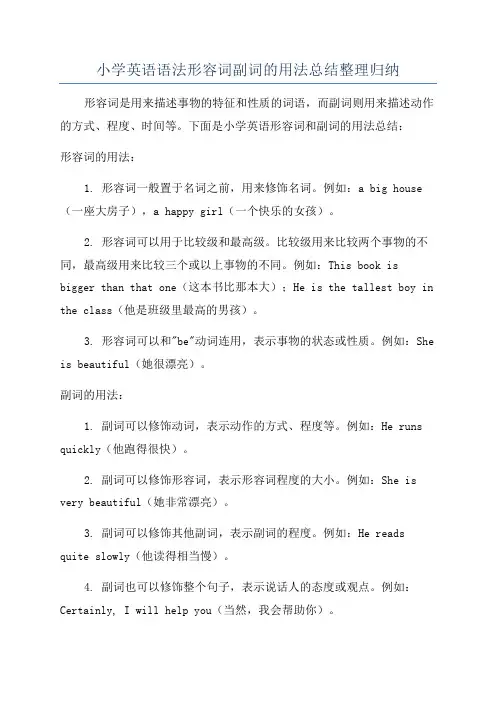
小学英语语法形容词副词的用法总结整理归纳形容词是用来描述事物的特征和性质的词语,而副词则用来描述动作的方式、程度、时间等。
下面是小学英语形容词和副词的用法总结:形容词的用法:1. 形容词一般置于名词之前,用来修饰名词。
例如:a big house (一座大房子),a happy girl(一个快乐的女孩)。
2. 形容词可以用于比较级和最高级。
比较级用来比较两个事物的不同,最高级用来比较三个或以上事物的不同。
例如:This book is bigger than that one(这本书比那本大);He is the tallest boy in the class(他是班级里最高的男孩)。
3. 形容词可以和"be"动词连用,表示事物的状态或性质。
例如:She is beautiful(她很漂亮)。
副词的用法:1. 副词可以修饰动词,表示动作的方式、程度等。
例如:He runs quickly(他跑得很快)。
2. 副词可以修饰形容词,表示形容词程度的大小。
例如:She is very beautiful(她非常漂亮)。
3. 副词可以修饰其他副词,表示副词的程度。
例如:He reads quite slowly(他读得相当慢)。
4. 副词也可以修饰整个句子,表示说话人的态度或观点。
例如:Certainly, I will help you(当然,我会帮助你)。
需要注意的是,有一些形容词和副词的形式是相同的,需要根据具体情况来判断其词性。
同时,有些形容词和副词可以通过在词尾加上"-ly"来转化为副词形式。
英语语法形容词和副词

5)句子中有助动词或be动词时,副词一般位 于助动词或be动词之后。如: The visitors have just arrived. 这些游客已经到达了。 The bus is always crowded. 车里总是拥挤的。
Exercise
2)形容词用在系动词之后,名词+系动词+形
容词,如: These flowers are red.这些花是红色的。(形 容词red在句中放在系动词be之后。) Bob looks smart today.今天鲍勃看上去很精神。
3 形容词用在不定代词后面。 Cathy found something strange in the magic box. 凯西在魔盒里发现了奇怪的东西。
much
副词的用法
(1)副词修饰动词时,通常位于被修饰动词
的后面。如: We should study hard.我们应该努力学习。 You walk too fast.你走得太快了。
(2)副词修饰形容词时,通常放在形容词
的前面。如: The boy is too young to go to school.那个 小孩子太小,不能去 上学。 Mark Twin is a very funny man.马克吐温是 一个非常有趣的人。
1) My father( ). A、works hard B、hard works C、work hardly 2) The dress is( ). A、beautiful quite B、quite beautiful C、quite beauty 3)Tom speaks English( ). A、well so B、well very C、so well 4)I ( )him speak English. A、often hear B、hear often C、hear usually 5)She ( )beautiful. A、so is B、is very C、very is
小学英语语法知识详解之形容词与副词
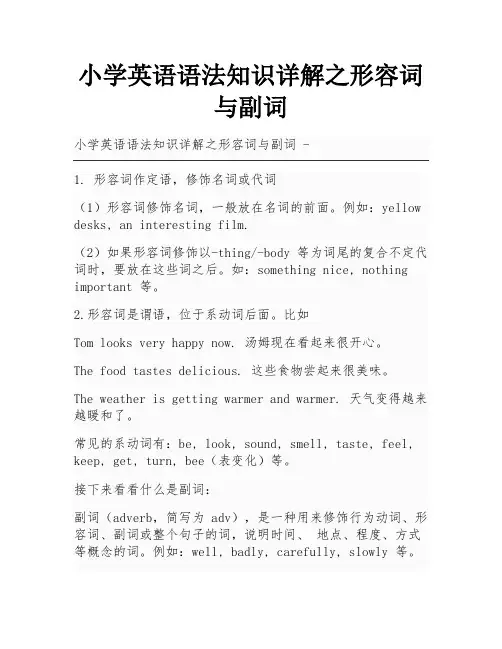
小学英语语法知识详解之形容词与副词1. 形容词作定语,修饰名词或代词(1)形容词修饰名词,一般放在名词的前面。
例如:yellow desks, an interesting film.(2)如果形容词修饰以-thing/-body 等为词尾的复合不定代词时,要放在这些词之后。
如:something nice, nothing important 等。
2.形容词是谓语,位于系动词后面。
比如Tom looks very happy now. 汤姆现在看起来很开心。
The food tastes delicious. 这些食物尝起来很美味。
The weather is getting warmer and warmer. 天气变得越来越暖和了。
常见的系动词有:be, look, sound, smell, taste, feel, keep, get, turn, bee(表变化)等。
接下来看看什么是副词:副词(adverb,简写为 adv),是一种用来修饰行为动词、形容词、副词或整个句子的词,说明时间、地点、程度、方式等概念的词。
例如:well, badly, carefully, slowly 等。
(对于什么是副词,也同样是运用跟汉语相联系的办法,前面说形容词就是带“的”的词,那么副词就是带“地”或者“得”的词了,我们知道在汉语中带“地”的词后面都是接动词,也就意味着英语中汉语解释带“地”的词也是用来修饰动词的,这样既可以很好的理解什么是副词也能顺便把副词的基本用法了解了,一举两得。
对于带“得”的词,在汉语中一般是接形容词的,比如说:开心得不得了,可以看得出“开心”是形容词,而“不得了”是修饰开心的程度的,于是中文含义带有“得”的词就是副词,且是用来修饰形容词或者副词的程度的)副词的分类方式副词: 表示动作和状态的进行和存在方式、方法,如:carefully, suddenly, fast, well, politely,但friendly lovely, lonely, lively elderly, ugly 为形容词程度副词: 多用来修饰形容词和副词,如:very ,much,enough,almost,rather,so,too,still,quite地点副词:here ,there ,everywhere, anywhere, home, upstairs, downstairs 等时间副词:tomorrow, now, today, then, yesterday, tonight 等频度副词:always,usually,often,never,sometimes,seldom,once,rarely,hardly 等疑问副词:why, when, where, how(引导特殊疑问句) how often, how long ,how soon, how much, how many 等关系副词:when, where, why (用于定语从句)其他also,either,too,only,perhaps(对于疑问副词和关系副词,小学不用做要求,认识就行!)接下来看看副词的基本用法:(1)修改行为动词以显示动作是如何执行的。
小学英语语法教案:形容词与副词
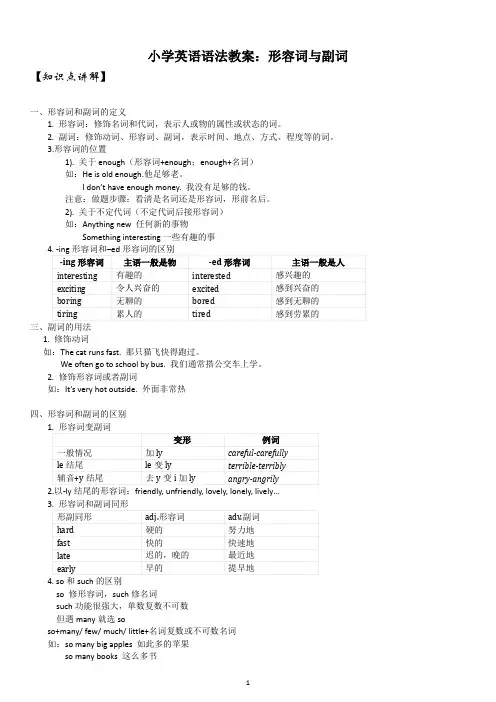
小学英语语法教案:形容词与副词【知识点讲解】一、形容词和副词的定义1. 形容词:修饰名词和代词,表示人或物的属性或状态的词。
2. 副词:修饰动词、形容词、副词,表示时间、地点、方式、程度等的词。
3.形容词的位置1). 关于enough(形容词+enough;enough+名词)如:He is old enough.他足够老。
I don’t have enough money. 我没有足够的钱。
注意:做题步骤:看清是名词还是形容词,形前名后。
2). 关于不定代词(不定代词后接形容词)如:Anything new 任何新的事物Something interesting一些有趣的事三、副词的用法1. 修饰动词如:The cat runs fast. 那只猫飞快得跑过。
We often go to school by bus. 我们通常搭公交车上学。
2. 修饰形容词或者副词如:It’s very hot outside. 外面非常热四、形容词和副词的区别2.以-ly结尾的形容词:friendly, unfriendly, lovely, lonely, lively…4. so和such的区别so 修形容词,such修名词such功能很强大,单数复数不可数但遇many就选soso+many/ few/ much/ little+名词复数或不可数名词如:so many big apples 如此多的苹果so many books 这么多书so few people 这么少的人so much money 那么多的钱so little milk 那么少的牛奶五、形容词副词的原级、比较级和最高级六、形容词副词的原级、比较级和最高级用法1. 原级形容词的本来形式就是形容词的原级。
1). “as…as”结构,表示“前者像后者一样”,A+do+as+adj./ adv. +as+B (+do).如:John is as tall as his brother. 约翰和他的哥哥一样高。
小学英语语法 形容词副词
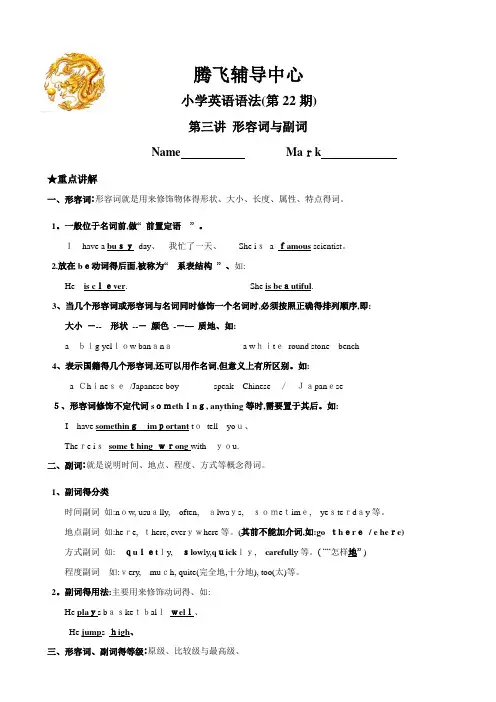
腾飞辅导中心小学英语语法(第22期)第三讲形容词与副词Name Mark★重点讲解一、形容词:形容词就是用来修饰物体得形状、大小、长度、属性、特点得词。
1。
一般位于名词前,做“ 前置定语” 。
Ihave a busyday、我忙了一天、She isa famous scientist。
2.放在be动词得后面,被称为“系表结构” 、如:He is clever. She is beautiful.3、当几个形容词或形容词与名词同时修饰一个名词时,必须按照正确得排列顺序,即:大小---形状---颜色--—质地、如:abig yellow banana a whiteround stone bench4、表示国籍得几个形容词,还可以用作名词,但意义上有所区别。
如:a Chinese/Japanese boy speak Chinese/Japanese5、形容词修饰不定代词something, anything等时,需要置于其后。
如:I have somethingimportant totell you、There issomething wrong withyou.二、副词:就是说明时间、地点、程度、方式等概念得词。
1、副词得分类时间副词如:now, usually,often,always,sometime,yesterday等。
地点副词如:here, there, everywhere等。
(其前不能加介词,如:go there/ e here)方式副词如:quietly,slow ly,quickly,careful ly等。
( ““怎样地” )程度副词如:very,much, quite(完全地,十分地), too(太)等。
2。
副词得用法:主要用来修饰动词得、如:He plays basketballwell、He jump shigh、三、形容词、副词得等级:原级、比较级与最高级、1、原级得用法肯定句:主语+ be动词+as + 原级+as 。
专题05 形容词与副词_备战2021年小升初英语必考语法和题型(解析版)
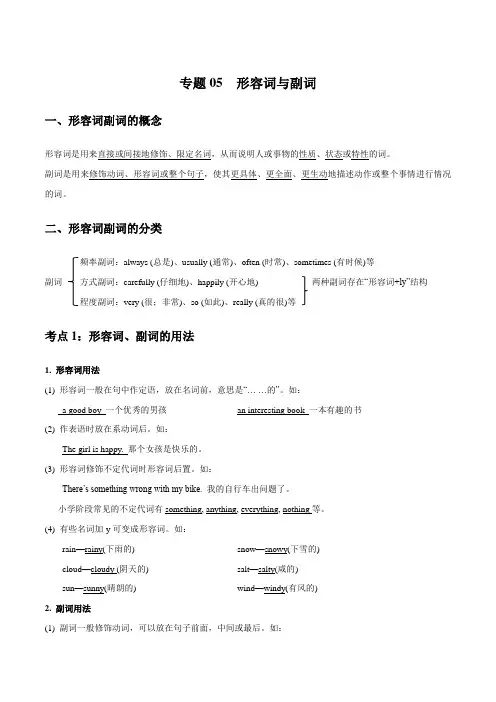
专题05 形容词与副词一、形容词副词的概念形容词是用来直接或间接地修饰、限定名词,从而说明人或事物的性质、状态或特性的词。
副词是用来修饰动词、形容词或整个句子,使其更具体、更全面、更生动地描述动作或整个事情进行情况的词。
二、形容词副词的分类频率副词:always (总是)、usually (通常)、often (时常)、sometimes (有时候)等副词方式副词:carefully (仔细地)、happily (开心地) 两种副词存在“形容词+ly”结构程度副词:very (很;非常)、so (如此)、really (真的很)等考点1:形容词、副词的用法1. 形容词用法(1) 形容词一般在句中作定语,放在名词前,意思是“… …的”。
如:a good boy 一个优秀的男孩an interesting book 一本有趣的书(2) 作表语时放在系动词后。
如:The girl is happy. 那个女孩是快乐的。
(3) 形容词修饰不定代词时形容词后置。
如:There’s something wrong with my bike.我的自行车出问题了。
小学阶段常见的不定代词有something, anything, everything, nothing等。
(4) 有些名词加-y可变成形容词。
如:rain—rainy(下雨的) snow—snowy(下雪的)cloud—cloudy (阴天的) salt—salty(咸的)sun—sunny(晴朗的) wind—windy(有风的)2. 副词用法(1) 副词一般修饰动词,可以放在句子前面,中间或最后。
如:They live happily.他们幸福地生活着。
(happily 快乐地,幸福地,修饰动词live)They are listening to the teacher carefully. 他们在认真地听老师讲。
(carefully 认真地,修饰动词listen)温馨提示:连系动词不用副词修饰,直接加形容词作表语。
形容词和副词 小学英语语法
形容词、副词编缉教师:Sean(刘恩孝)授课时间:授课地点:龙文教育长安校区1、形容词表示某一事物或人的特征,副词表示某一动作的特征。
形容词和副词有三种形式:原形、比较级、最高级。
比较级:+er 最高级:the …+est两个重要特征:as……as中间一定用原形,than的前面一定要+er。
2、形容词、副词比较级的规则变化如下:(1)一般直接+er。
如:tall - taller, fast - faster 单音节词如果以-e 结尾,只加-r。
如:late – later(2)重读闭音节词如末尾只有一个辅音字母,须双写这个字母,再加-er。
如:big - bigger, fat - fatter(3)以辅音字母加-y结尾的词,变y为i,再加-er。
如:heavy - heavier, early - earlier(4)双音节和多音节词的比较级应在原级前加more构成。
如:beautiful - more beautiful, careful - more careful,quietly - more quietly, interesting - more interesting(5)有些不规则变化的,须逐一加以记忆。
如:good/well – better, bad/ill – worse, many/much – more,far – farther/further, old –older/elder…形容词、副词练一练:全卷满分:拟题人:Sean(刘恩孝)拟题时间:1、写出下列形容词、副词的比较级。
big good longtall old short t hin heavy youngfat light stronghigh far lowearly late wellfast slow2、用括号内所给单词的适当形式填空。
1) I can swim as _______ ( fast ) as the fish, I think.2) Look! His hands are _______ ( big ) than mine.3) I think you do these things_______ ( well ) than your classmates.4) Whose bag is _______ ( heavy ), yours or mine?5) Does Jim run as _______(slow ) as David? Yes, but Mikeruns_______ ( slow ) than them.6) You have seven books, but I have _______ ( many ) than you.I have ten.7) I jump _______ ( far ) than some of the boys in my class.8) I’m very_______ ( thin ), but she’s _______ ( thin ) than me.9) It gets _______and_______ ( warm ) when spring comes here.。
小学英语语法——形容词与副词知识点讲解+练习
形容词和副词一、形容词、副词概述1、形容词定义:形容词(adjective),简称adj,用来修饰名词或代词,表示人或事物的性质、状态和特征。
2、副词定义:副词(adverb),简称adv,用来修饰动词、形容词或副词,表示时间、频率、范围、语气、程度等。
二、形容词、副词考点纵览三、综合练习( ) 1. How beautifully she sings! I have never heard _____ voice.A. a betterB. a bestC. the betterD. the best ( ) 2. She looks very _____ but I can’t remember her name.A. similarB. familiarC. friendlyD. strange ( ) 3. Children all looked _____ at the broken model plane and felt quite _____.A. sad; sadB. sadly; sadlyC. sad; sadlyD. sadly; sad( ) 4. The child dreamed that he had once lived in a _______ house in the forest.A. wooden pretty littleB. little pretty woodenC. pretty little woodenD. wooden little pretty( ) 5. ---Which team is _______ to win the game?---I don’t know, but I’ve found _______ for ours to win.A. probable; it unlikelyB. likely; it possibleC. possible; it possibleD. likely; it possibly( ) 6. With the development of the Internet, _______ communication is done by regular mail.A. lessB. moreC. littleD. few( ) 7. ---If you don’t like the red coat, take the blue one.---OK, but do you have ______ size in blue? This one’s a bit tight for me.A. a bigB. a biggerC. the bigD. the bigger( ) 8. If there were no examinations, we should have ______ at school.A. the happiest timeB. a more happier timeC. much happiest timeD. a much happier time( ) 9. This dress is prettier, but it costs ______ that one.A. twice more thanB. twice as much asC. as much twice asD. twice so much as( ) 10.________students are required to take part in the boat race.A. Ten strong young ChineseB. Ten Chinese strong youngC. Chinese ten young strongD. Young strong ten Chinese( ) 11. Allen had to call a taxi because the box was ____to carry all the way home.A. much too heavyB. too much heavyC. heavy too muchD. too heavy much( ) 12. Our neighbor has ________ours.A. as a big house asB. as big a house asC. the same big house asD. a house the same big as( ) 13. We were in ________when we left that we forgot the airline tickets.A. a rush so anxiousB. a such anxious rushC. so an anxious rushD. such an anxious rush( ) 14. ---I was riding along the street and all of a sudden, a car cut in and knocked me down.---You can never be ________careful in the street.A. muchB. veryC. soD. too( ) 15. ---You don’t look very ________.Are you ill?---No,I’m just a bit tired.A. goodB. wellC. strongD. healthy( ) 16. Four of Robert’s children were at the party,including ________, Luke.A. the eldestB. an oldest oneC. the oldD. an old one( ) 17. Many students signed up for the ________race in the sports meeting to be held next week.A. 800-metre-longB. 800-metres-longC. 800 metre lengthD. 800 metres length( ) 18. It’s always difficult being in a foreign country,________if you don’t speak the language.A. extremelyB. naturallyC. basicallyD. especially( ) 19. In recent years,travel companies have succeeded in selling us the idea that the further we go,__________.A. our holiday will be betterB. our holiday will be the betterC. the better our holiday will beD. the better will our holiday be( ) 20. When he heard a cry for help, he ran out as ________ as he could.A. hardlyB. quicklyC. finallyD. slowly( ) 21. “Our team is _____ to win the match.” “Really? But I don’t think so.”A. easyB. difficultC. possibleD. sure( ) 22. A ______ road goes ______ from one place to another.A. straight; straightB. straightly; straightlyC. straight; straightlyD. straightly; straight( ) 23. “This book is ______ more useful for us students.” “Yes, but it is _______ too difficult.”A. quite; quiteB. much; ratherC. rather; quite D quite; much( ) 24. There was a ______ change in the weather, and the rain came pouring down.A. quickB. slowC. fastD. sudden( ) 25. You can speak ______ in front of him, but you can’t eat ______ in his restaurant.A. freely; freelyB. free; freelyC. freely; freeD. free; free( ) 26. Tom will not be at the picnic, ______ to the family’s disappointment.A. muchB. moreC. too muchD. much more( ) 27. --- I have seen so little of Mike ______. Is he away on business?--- Oh, no. He just leaves for his office early and comes back very ______.A. later; latelyB. later; laterC. lately; lateD. late; lately( ) 28. From his ______ voice on the phone I know everything is well under way.A. satisfactoryB. satisfyingC. satisfiedD. satisfaction( ) 29. In ______ Chinese culture, marriage decisions were often made by parents for their children.A. traditionalB. historicC. peacefulD. civil( ) 30. The houses in the village are ______ built of wood and hay.A. mostB. almostC. nearlyD. mostly( ) 31. --- What do people wear when they go to the theatre?--- Well, it isn’t very ______. People can wear anything they like.A. normalB. certainC. modernD. simple( ) 32. Mary’s biology is ______ than ______ in the class.A. a lot of better; anyone else’sB. far better; anyone’s else’sC. much better; anyone elseD. a lot better; anyone else’s( ) 33. We decided not to climb the mountains because it was raining ____.A. badlyB. hardlyC. stronglyD. heavily( ) 34. Paris is one of _____ cities in the world.A. more beautifullyB. more beautifulC. the most beautifullyD. the most beautiful ( ) 35. Are you going to leave______?A. the open windowsB. the windows openingC. the windows openD. the windows opened( ) 36. Bob never does his homework _____ Mary, so he makes lots of mistakes.A. so careful asB. as carefully asC. carefully asD. as careful as.( ) 37. My sister is good at sports. She can jump ____ than me.A. highestB. very highC. too highD. much higher ( ) 38. When spring comes, the trees get ____.A. green and greenB. green and greenerC. greener and greenD. greener and greener( ) 39.He works very ___________.He _____________has a rest on Sundays.A. hard; hardlyB. hardly; hardC. hard; hardD. hardly; hardly( ) 40.He learns Russian_____________.A. goodB. niceC. wellD. fine( ) 41.The boy didn’t run______________ to catch the bus.A. fast enoughB. enough fastC. quick enoughD. enough quickly ( ) 42.Eating _____________ is bad for our health.A. much tooB. too muchC. too moreD. too many( ) 43.Have you ever seen ______________ big panda before?A. a suchB. such aC. so aD. as( ) 44.He looks very _____________ today.A. worriedB. worryC. worryingD. to worry( ) 45.Listen to me. I have _____________ to tell you.A. important somethingB. important anythingC. something importantD. anything important( ) 46. ---How ___ can you finish the drawing?--- In ten minutes.A. longB. often.C. soonD. rapid( ) 47. This book is _____ worth seeing again.A. veryB. quiteC. wellD. much( ) 48. My _____ brother is three years ____ than I .A. old; olderB. elder; olderC. older; elderD. old; elder( ) 49. We felt ___ after we watched the ___ football match.A. exciting; excitedB. excited; excitingC. excited; excitedD. exciting; exciting( ) 50. The old man lived ____ in the house, but he didn’t feel___.A. lonely; lonelyB. alone; lonelyC. alone; aloneD. lonely; alone小学英语语法——形容词与副词知识点讲解+练习参考答案1. A2.B3.D4.C5.B6.A7.B8.D9.B 10.A 11. A 12.B 13.D 14.D 15.B 16.A 17.A 18.D 19.C 20.B 21. D 22.A 23.B 24.D 25.C 26.A 27.C 28.C 29.A 30.D 31. B 32.D 33.D 34.D 35.C 36.B 37.D 38.D 39.A 40.C 41. A 42.B 43.B 44.A 45.C 46.C 47.C 48.B 49.B 50.B11。
小升初小学英语语法专题精讲:形容词和副词
一、形容词和副词的比较等级
Lead in
3.形容词、副词的比较级一般用来表示:”比...更...“这类概念,通常用一个由连词
than引导的状语从句来表示”和......相比“。
比较级前有时可以有一个表示程度的状语。例如:
我比海伦小两岁。
I am two years younger than Helen.
Language points
形容词,副词同级比较的基本句式: 2.表示“甲在某方面不如乙”:甲+be not/动词+as/so+ 原级+as+乙。例如: 我的头发不及你的长。 My hair is not as/so long as yours. 苏海跑的不及我快。 Su Hai doesn't run as fast as me.
一、形容词和副词的比较等级
Lead in
2.形容词、副词比较级和最高级有规则变化和不规则变化。
(2)不规则变化 good/well- better-best many/much-more-most far-further-furthet( 表程度) old-older-oldest(表新旧)
bad- worse-worst little-less-least far-farther-farthest( 表远近) old-elder-eldest(表兄弟姐妹之间的长幼)
This room is as big as that one.
我的书和你的一样有趣。
My book is as interesting as yours.
Language points
形容词,副词比较级的基本句式: 1.甲+be/动词+形容词/副词比较级+ than+乙。例如: Gao Shan is heavier than me.高山比我重。 Wang Bing jumps farther than Liu Tao. 王兵跳得比刘涛远。 2.甲+be/动词+程度状语+形容词/副词比较级+than+乙。例如: I'm three years older than my bother.我比我弟大三岁。 3. 疑问词+be/动词+形容词/剧词比较级,甲or乙?例如: Who swims faster,your mother or your aunt? 你母亲和你姑姑谁游得更快?
小学英语语法形容词,副词的用法总结整理归纳
④ 程度副词一般放在形容词或副词之前。动词之前或者句尾。
eg: I study English very hard.我学习英语很努力。
I really like reading. 我真的喜欢看书。
She speaks English well.她英语说得很好。
⑤ 频度副词放在情态动词,be 动词,助动词的后面,实意动词的前面
分类
定义
简单形容词 由一个形容词单独构成
由几个形容词共同组成 合成形容词
并起形容词的作用
例词 nice green clever beautiful rainy long
ten-year-old(10 岁的) two-year(2 年的)
(2)副词的分类
分 定义
类
例词
时
now(现在),today(今天),yesterday(昨天),
friendly—friendlier,friendliest—more friendly,most friendly 3 形容词前加 less 和 least,则表示“较不”和“最不” 如:important 重要,less important 较不重要,least important 最不重要
五、形容词/副词的原级、比较级、最高级的用法 (1)原级的用法
① 肯定句中用“as+形容词/副词的原级+as”表示比较的两个对象在程度上相 同或相等。 eg: Tom is as tall as his brother.汤姆和他的哥哥一样高。
My hair is as long as yours. 我的头发与你的头发一样长。 Jack runs as fast as his brother. 杰克和他的哥哥跑得一样快。 ② 否定句中用“not so/as+形容词/副词的原级+as”表示“……不如……”。 eg: His bedroom is not so/as big as his sister´s. 他的房间不如他姐姐的大。 Lucy doesn´t dress so/as ely as Lily. 露西穿得不像莉莉那么可爱。 (2)比较级的用法(两者比较) ① “ A + 动词 + 形容词/副词比较级 + than + B”,意思为“A 比 B 更……”。
- 1、下载文档前请自行甄别文档内容的完整性,平台不提供额外的编辑、内容补充、找答案等附加服务。
- 2、"仅部分预览"的文档,不可在线预览部分如存在完整性等问题,可反馈申请退款(可完整预览的文档不适用该条件!)。
- 3、如文档侵犯您的权益,请联系客服反馈,我们会尽快为您处理(人工客服工作时间:9:00-18:30)。
美丽的花 beautiful flowers
something important 昂贵的车
an expensive car
快乐的女孩 a happy girl
形容词用来修饰名词或代词,表示人或 事物的性质、状态和特征。
2
形容词的作用
典型例题 1
Do you know ____ in
simple-simply
4、true是唯一 一个需要去掉字母e,再加ly的单词。
true-truly
1. Are you__g_o_o_d___at English ? Can you speak English___w_e_l_l __? ( good ) 2. How are you? I'm___w_e_l_l__. Do you do___w_e_ll___in your study ? (well ) 3. If we want to be__h_e_a_lt_h_y_,we must eat_h_e_a_l_t_h_il_y.(healthy) 4. Look! They are playing_h_a_p_p_i_ly__in the park. They are very__h_a_p_p_y__. (happy) 5. We must listen to the teacher_c_a_r_e_f_u_ll_y.(careful) 6. He is very__a_n_g_r_y__and closed the door__a_n_g_ri_ly__.(angry) 7. Tom can work out the problem__e_a_s_i_ly__.(easy) 8. It was a ___h_e_a_v_y_ rain. It also rained __h_e_a_v_il_y__ yesterday. (heavy)
副词用来修饰动词、形容词或副词,表 示方式、程度等。
6
副词的作用
作状语
副词作状语修饰动词时,一般放在动词后面。
They are laughing happily. All the boys run quickly on the playground.
副词作状语修饰形容词和副词时,放在形容 词和副词前面。
The woman is always angry with his husband.
8
+ly
形容词
副词
1、一般情况下,形容词变副词,直接在词尾加上ly。
careless-carelessly quiet-quietly quick-quickly
2、以辅音字母加y结尾的形容词,变y为i再加ly。
3
表语
形容词作表语,放在系动词(be, feel, look, smell, taste, sound, get, become, keep, turn, seem等)之后。
Everything will be good. After a long walk, I felt tired.
典型例题 1
heavy-heavily
happy-happily angry-angrily
healthy-healthily easy-easily
noisy-noisily
3、以le结尾的形容词,变le为ly。
possible-possibly
terrible-terribly
gentle-gently
comfortable-comfortably
This picture is not so good as that one. Tim does not run so quickly as Jack.
11
形容词与副词 比较级和最高 级的用法
变化 规则
一般情况直接在词尾加er/est。 short-shorter-shortest cold-colder-coldest
以e结尾的单词,在词尾加上r/st。 wide-wider-widest large-larger-largest
单个辅音字母结尾的重读闭音节词, 双写末尾辅音字母加er/est。 big-bigger-biggest hot-hotter-hottest
典型例题 1 She always makes her history class very ______. A. interest B. interests C. interesting D. interested
5
副词
很快地跑 run quickly
努力地学习 study hard
非常胖 very fat
10
形容词与副词原级的用法
“as+形容词/副词原级+as”结构,意为“与……一样”。 His father is as old as his mother. Tom studies as carefully as his brother.
“not as/so+形容词/副词原级+as”,意为“不如,比不上”。
this field?
定语
形容词作定语,放在名 词之前,不定代词之后。
A. anybody famous B. famous anybody C. somebody famous
He lives in a beautiful house.
D. famous somebody
There is nothing important in today's newspaper.
The girl is seriously ill. The boy studies very hard.
7
副词的分类
频率副词一般放在行为动词之前,情态动词,助动词和be动词之后。
He often goes to work on foot.
Who can never sleep for three days?
-What do you think of
the cake?
-It tastes ________.
A. good
B. badly
C. well
D. terribly
4
宾语补 足语
形容词做宾语补足语,放在宾语之后,常 与make, leave, keep, find等动词连用。
He keeps the classroom clean every day. Who makes you angry?
